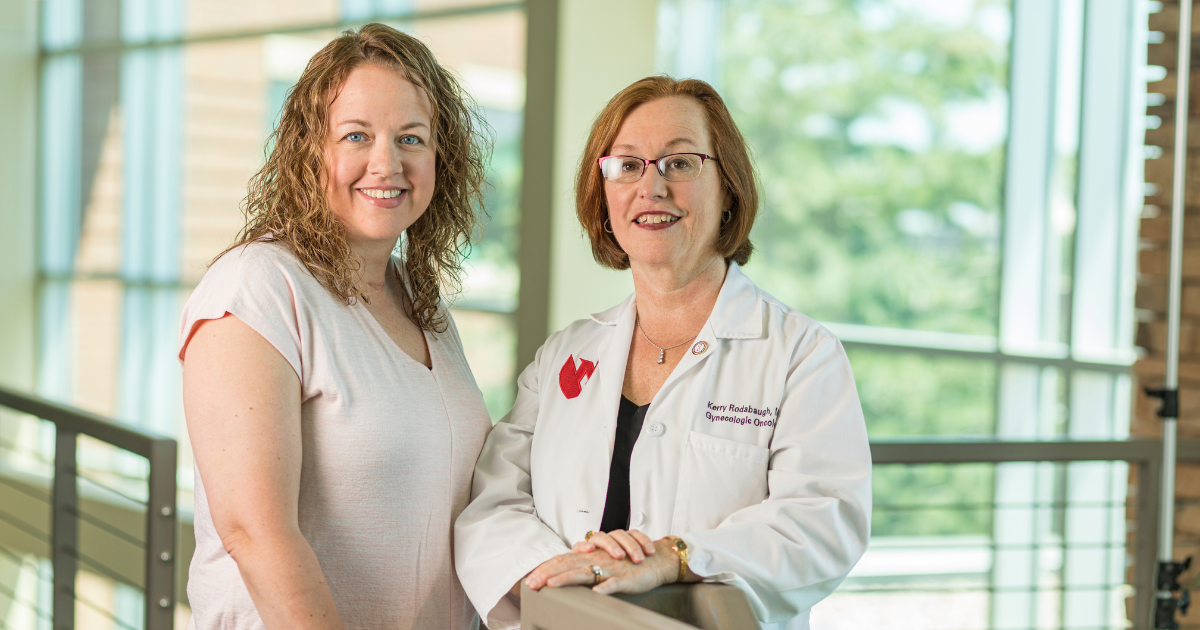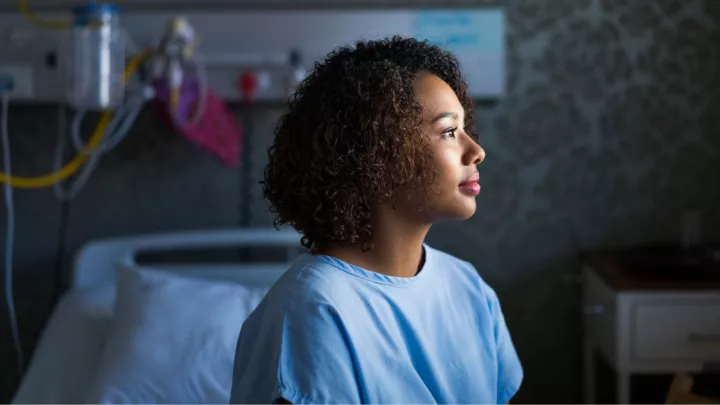Early detection of cervical cancer could save your life

Jackie Frum says she could probably make the 60 mile trip from her home in Earling, Iowa, to the Nebraska Medical Center wearing a blindfold.
She estimates that she and her husband have traveled that familiar course more than 100 times over the last few years since her first visit with Nebraska Medicine gynecologic oncologist Kerry Rodabaugh, MD, in October 2016.
All women should begin regular Pap tests by age 21 to prevent cervical cancer. To schedule an appointment with an OB-GYN, call 800.922.0000.
Her first 60 mile round trip was the most difficult. That’s when she received the surprising news that she had cervical cancer. “I knew that someday in my life I might be diagnosed with cancer, but I always thought it would be breast cancer,” recalls Frum.
You see, years earlier, Frum’s mother had died of breast cancer at the age of 56. Genetic testing revealed that both she and her mother were carriers of the same BRCA1 gene mutation. The BRCA1 and BRCA2 gene mutations increase a person’s risk of developing breast cancer to 70%, and for developing ovarian cancer to 41%.
Being proactive is the name of the game when it comes to the BRCA1 and BRCA2 gene mutations. So at age 39, Frum found herself in Dr. Rodabaugh’s office discussing preventive measures she should consider taking as a BRCA1 mutation carrier. Cervical cancer was the last thing on her mind.
Dr. Rodabaugh suggested she start with a comprehensive physical exam and a cancer screening for cervical cancer called the Pap test. That’s when Dr. Rodabaugh discovered a tumor on Frum’s cervix.
Further testing confirmed Dr. Rodabaugh’s suspicion. Frum had cervical cancer that was unrelated to her family history. Scans also revealed several lumps on her thyroid, which a biopsy determined were not cancerous.

“I was so focused on my risk for breast and ovarian cancer, that I had not been keeping up with my Pap tests,” says Frum. “Now I understand more than ever the importance of preventive screenings for cancer. They are there for good reason, we just have to make sure we use them.”
Dr. Rodabaugh suggested they monitor the thyroid and begin with removing the ovaries, a preventive, minimally invasive, outpatient procedure to reduce her risk for developing ovarian cancer. The following week, Frum was ready to begin phase two of her journey – treatment for cervical cancer.

Per Dr. Rodabaugh’s recommendation, she enrolled in a clinical trial for cervical cancer that involved a regimen of chemotherapy in addition to radiation therapy, administered by Nebraska Medicine radiation oncologist Andrew Wahl, MD. “He was so personable and always made me feel so comfortable,” recalls Frum. “On the last day of treatment, he came in wearing a special T-shirt that my family had made for all of us. It was very touching.”
At the April 2017 follow up visit with Dr. Rodabaugh, approximately five months later, Frum received the news that she was in remission.
She was ready to begin phase three. Over the next two years, Frum would undergo a double mastectomy, a preventive surgery recommended for BRAC1 carriers.
The double mastectomy was followed by DIEP flap breast reconstructive surgery performed by Shannon Wong, MD, Nebraska Medicine plastic and reconstructive surgeon. Instead of using implants, DIEP flap uses excess skin and fat from the abdomen to construct a new breast, which provides a more natural feeling breast.
Her breast reconstruction evaluation and follow up visits took place at Dr. Wong’s clinic at the Cancer Center at Village Pointe Health Center. “I loved going there,” she recalls. “It was so easy to get in and out, there was never a wait and everything was so convenient.”
But Frum’s journey was not over yet. Abbey Fingeret, MD, Nebraska Medicine surgical oncologist, suggested the lumps on her thyroid be removed. To Frum’s relief, the lumps were benign.
Jackie says she had complete confidence in Dr. Rodabaugh and all of her Nebraska Medicine doctors. “After Dr. Rodabaugh told me I had cervical cancer and explained how we were going to treat it, she said, ‘we got this’ and I knew she did. Dr. Rodabaugh and her staff were so awesome and caring. It was like they were fighting right alongside me. And so was every other doctor I saw there after her.”
While the last three years have been both physically and emotionally challenging, Frum barely skipped a beat when it came to keeping up with a busy family of five boys. She continued working, celebrated the graduation of a son from college, planned two of her sons’ weddings, helped one of them move to Georgia and threw a high school graduation party for her youngest son. And through it all, her mantra remained: “I've got this!”
“She has had the best attitude in the world,” notes Dr. Rodabaugh. “She has taken it all in stride and just keeps pushing forward and staying busy with work and family. Jackie is cancer free today, in part, because of the comprehensive care we provided. We didn’t just take care of one thing, we looked at the whole person, which enabled us to diagnose and treat everything from the cervical cancer to the thyroid nodules to performing her preventive surgeries.”
Frum says it has all been worth it. “My mother didn’t get to have the choices I’ve had,” she says. “I’m hoping all of this will add another 40 years and more to my life.
“I also learned another big lesson from all of this. Keep up with your cancer screenings.”





